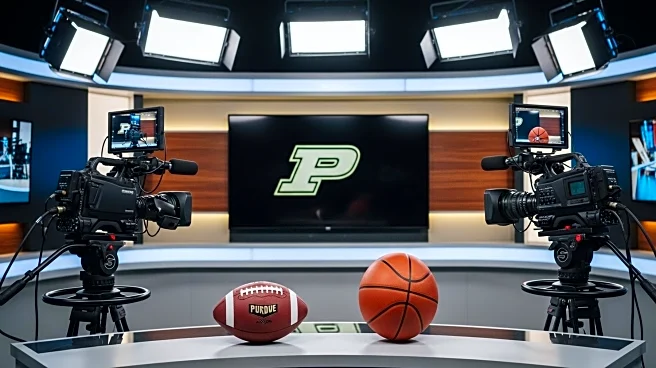What's Happening?
NBC Sports faced criticism for its initial decision to prioritize the Purdue-Notre Dame game over the Illinois-Indiana matchup, both scheduled for broadcast on Saturday. Due to a weather delay, the Purdue-Notre Dame game extended into the time slot for Illinois-Indiana. NBC initially announced that the Illinois-Indiana game would start on Peacock, with NBC joining in progress after the conclusion of the Notre Dame game. However, after backlash from viewers who wanted to watch the ranked conference matchup between Illinois and Indiana, NBC reversed its decision. The Illinois-Indiana game began on NBC at 7:50 p.m. Eastern, while the Notre Dame game continued on Peacock. The decision to switch was influenced by the lack of suspense in the Purdue-Notre Dame game, which had a significant score gap, and the importance of the Illinois-Indiana game as a top-20 matchup.
Why It's Important?
The incident highlights the growing influence of viewer feedback on broadcast decisions, especially in sports programming. NBC's quick reversal underscores the importance of audience engagement and the need to balance traditional broadcasting with streaming services. This decision impacts how networks might handle similar situations in the future, potentially prioritizing high-stakes games over less competitive ones. The backlash also reflects the increasing expectation for networks to cater to fan preferences, which could lead to more dynamic programming strategies. This shift may affect advertising strategies and revenue, as networks strive to maintain viewership and satisfy audience demands.
What's Next?
NBC's decision may prompt other networks to reevaluate their programming strategies, especially when dealing with simultaneous broadcasts of multiple games. Networks might develop more flexible approaches to accommodate viewer preferences, potentially increasing the use of streaming platforms for less popular games. Stakeholders, including advertisers and sports leagues, may push for more consistent policies to ensure high-profile matchups receive appropriate coverage. Additionally, NBC may analyze viewer feedback to refine its approach to future broadcasts, aiming to minimize backlash and optimize audience satisfaction.
Beyond the Headlines
The incident raises questions about the role of streaming services in sports broadcasting. As networks increasingly rely on platforms like Peacock, the balance between traditional TV and digital streaming becomes crucial. This shift could lead to broader changes in how sports are consumed, with implications for accessibility and viewer experience. The backlash also highlights the power of social media in influencing corporate decisions, as public opinion can rapidly shape network strategies.









